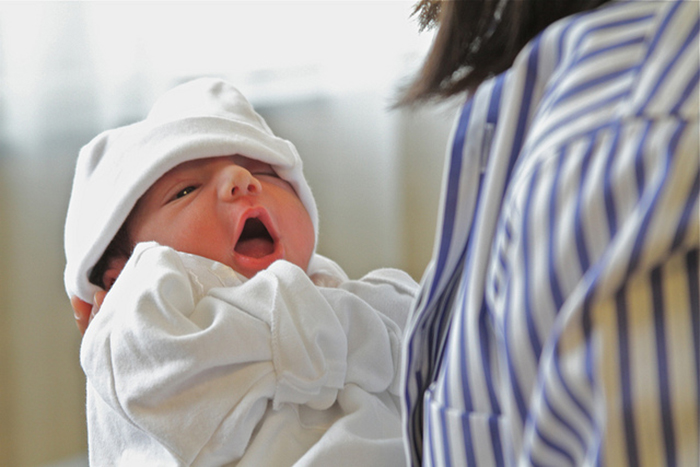

According to statistics, 80% of children suffer from regurgitation, especially in the first six months after birth. Approximately 67% of newborns under 4 months spit up at least once a day.
Regurgitation in newborns is a standard reaction to new food and to new living conditions of a still fragile organism. She does not say at all that the baby is sick.
Regurgitation occurs in perfectly healthy children. In most cases, the phenomenon resolves on its own during the first year of a baby's life.
However, in 23% of babies, regurgitation is still associated with an illness or health problem. To understand if there are problems, it is necessary to determine the causes.

Frequent regurgitation in large quantities or regurgitation in infants with a fountain also requires specialist advice. Frequency and volume are determined on a five-point scale.
When regurgitation in infants with an intensity of more than 3 points, you should consult a doctor! In addition, pay attention to the behavior of the baby. Strong crying during feeding indicates problems.
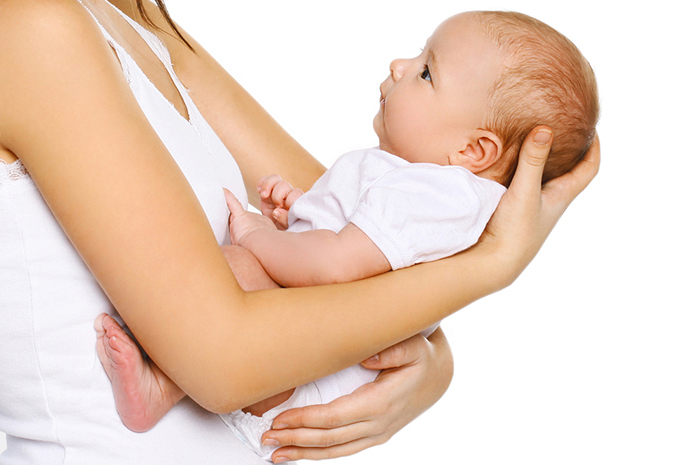
Remember that there are no safe medications to reduce regurgitation! Be sure to consult your doctor before taking medication!
However, you yourself can help the baby solve the problem or prevent the disease:
If you follow these tips, you will prevent spitting up or reduce the intensity. If the causes are colic and increased gas formation, then the diet of a nursing mother should be properly drawn up.
Fennel-based preparations will help. Fennel will reduce the amount of gas and pressure on the walls of the stomach.
Most often, the cause of regurgitation is the air that enters the body of infants along with milk. In this case, it is important to establish feeding the baby.
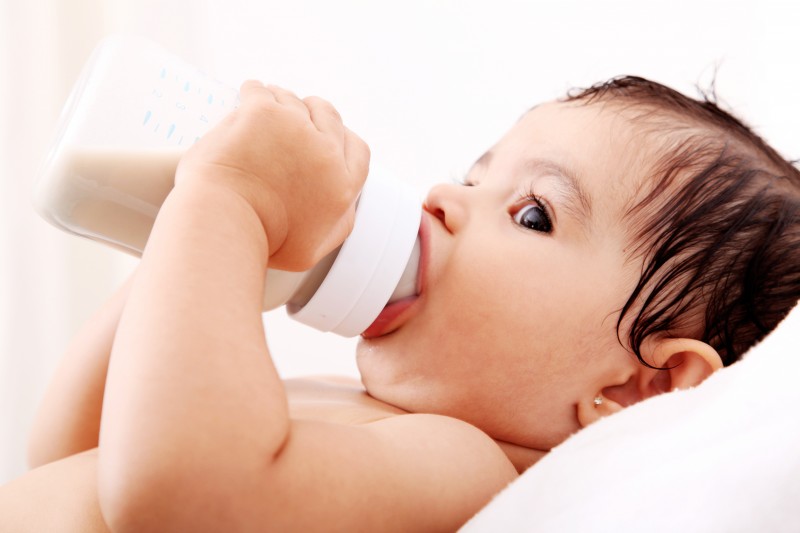
Regurgitation in newborns goes away when they start to sit. This occurs 6-7 months after birth.
After feeding, newborns and even older babies have a feature of regurgitation. But why is this happening? This is because regurgitation is a natural process for babies, so mothers periodically observe this phenomenon after feeding. Does the baby eat at the same time if he spits back a lot? After all, babies, so, eat a little, and such a phenomenon as regurgitation completely devastates the children's body. Is it so?
"Why does the baby spit up breast milk?" - the most popular question among young newly-made mothers. After all, regurgitation, as you know, is a response in this case of the stomach to various types of disorders and irritants. But regurgitation does not cause discomfort to the baby at all, since this process is absolutely normal. Every child goes through such a school, so young parents should not panic if they observe this phenomenon. But regurgitation is of different types, but what these types mean, this article will tell. What are the main causes of regurgitation in infants, what kind of this phenomenon is considered wrong, what should be done in such cases.
There are a lot of reasons for the appearance of this process, but before voicing them, let's find out what regurgitation is from the point of view of medicine. So, in medicine, the process of regurgitation is nothing more than the actual return of the contents of the stomach or esophagus. This occurs due to overeating of the child, when his body is already full, and the signal to the brain has not yet been given to stop the supply of milk. But this is not the only reason, you can find out about all the factors that determine the occurrence of the process a little lower.
It is important for young parents who are trying to find the answer to the question: “Why does the child spit up after feeding?” It is important to know that the return of food eaten comes from the stomach or esophagus, but by no means from the intestines. The process of returning nutrients from the intestines has a different name - vomiting. What is the difference? - you ask. We already know the essence of regurgitation, now let's take a closer look at what vomiting is. Vomiting refers to a rather complex process of a reflex type, through which the contents of the intestine are brought out through the oral cavity.
Vomiting is often the first herald of various diseases and indicates a malfunction of the newborn's body. But the process of regurgitation is not as dangerous as vomiting, but sometimes it can be fatal.
For your information! Babies between the ages of zero and four months have a tendency to spit up during sleep, so if the baby is in the wrong position during this period, it runs the risk of choking on vomit.
This is already known to many young mothers, as they are warned about this even in the maternity hospital.
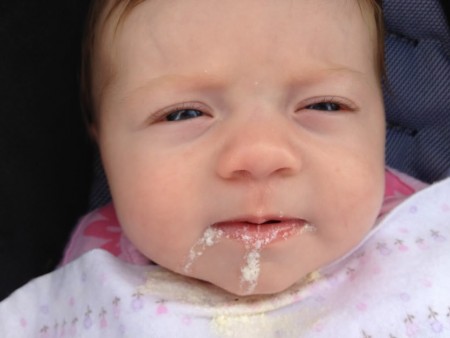
The main reasons for the appearance of such a process in newborns are two factors:
If the baby was overfed;
- as a result of swallowing air.
The stomach of an infant is very different from that of an adult. First of all, it is the difference in size. If the stomach of an adult is full, then further eating will lead to stretching of the walls of the gastrointestinal tract. The baby, when overeating, does not have such a function, and therefore if the baby overeats, then all the excess will come out on its own. Sometimes regurgitation during overeating is displayed by a fountain, but more on that later.
Swallowing air during feeding causes belching in addition to regurgitation. Why is the child swallowing air? The whole point is not in its physiological structure, but in the wrong application of it to the chest. New mothers in the maternity hospital are always shown and taught how to properly attach newborns to the breast.
For your information! The process of breastfeeding involves the location of the baby at an angle of 45 degrees in relation to the breast. The position horizontally or lying on the knee is not at all correct and leads to the swallowing of air.
It is worth noting that the primary causes of this phenomenon are presented above, but there are also secondary ones, which are characterized by the following factors:
1) Mixture change. When a child is fed with artificial mixtures, the change in the manufacturer of this product causes some stress in the baby, which manifests itself in the form of regurgitation.
2) When overtired. If, after feeding, the baby starts active wakefulness, then this can eventually lead to regurgitation (in frequent cases, a fountain).
3) When teething. When the first teeth appear in the baby, this process is caused by increased salivation. In order for the stomach to get rid of excess saliva, the reverse process occurs.
4) If the baby suffers from bloating, colic or dysbacteriosis, then the secondary symptoms of these ailments are frequent regurgitation.
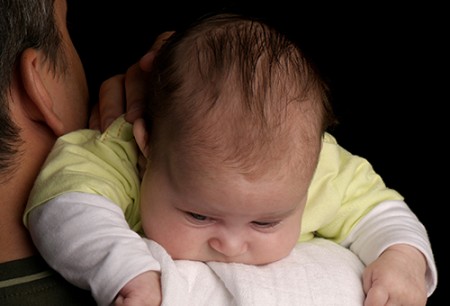
If parents observe the process when the baby often spits up a fountain, then this indicates problems with the gastrointestinal tract or with the brain. It is also possible that the baby often spits up a fountain if he has a brain injury during gestation or childbirth. It is beyond the power of an ordinary pediatrician to get rid of the problem of regurgitation with a fountain, therefore, in such a situation, an examination by a neurologist will be required.
But that's not all. Often, a baby can burp with a fountain even with strong pressure on the tummy. This can occur with tight swaddling, with pressure, or during active wakefulness. Some babies spit up during whims and crying, which is very dangerous. If in the process the vomit enters the respiratory tract, then it is almost impossible to avoid the phenomenon of asphyxia (suffocation).
Thus, if you often observe that the baby has a tendency to spit up a fountain, then it is better to see a doctor to determine the exact cause of the disease.
If infant often spit up after eating, then this is a normal process. But if this process has the form of removing excess food through the nose. Is it dangerous?
The phenomenon of regurgitation through the nose is critically dangerous, since this process usually leads to the formation of polyps and adenoids. Thus, it is very important that the process of regurgitation through the nose is prevented by caring parents. If the usual process does not cause discomfort to the baby, then through the nose it brings a lot of inconvenience:
Firstly, there is a risk of getting vomit into the respiratory tract;
Secondly, the mucous membrane of the baby's nose is irritated, which leads to the appearance of snot, etc.;
Thirdly, the remnants of the masses dry up on the walls of the nasal cavity, which leads to difficulty breathing. If the nose is not cleaned during this period, the baby may experience shortness of breath.

Usually, as in adults, and, accordingly, in children, vomiting is carried out through the nose. This is normal, as vomiting is an uncontrolled process where vomit comes from the intestines and travels all the way to the mouth. If regurgitation occurs through the nose, then this indicates that the vomit is so large that it is excreted not only through the mouth. In this case, it is important to follow the process, and if regurgitation through the nose is observed many times in a row, then it is best to visit a pediatrician to diagnose the disease. Often, the process of removing excess food through the nose causes respiratory diseases in the child in the future, so at one point, surgical removal of adenoids or a polyp will be required.
The danger of the process of removing food residues through the nose in infants is a rather dangerous phenomenon, which is better to avoid in the early stages than to try to cure accumulated diseases later.
If the child is on artificial feeding, then the process of spitting up food after each feeding is quite common. Why is this happening? There is nothing surprising in this, and the reasons for this are similar to breastfeeding. If the mother does not properly hold the bottle with the nipple, as often happens, then the phenomenon of spitting up food is inevitable. Why? Because along with milk, the baby swallowed air. Now the air along with the milk leaves the body. If this phenomenon occurs after each feeding, then it is important to reconsider the method of holding the bottle. It is important that no air is present in the nipple during sucking. During feeding, it is necessary to place the child exclusively in a reclining position.

Many mothers believe that a monthly baby should burp the least of all, in which they are actually mistaken. The fact is that in the first month the child learns the world in all directions. He may experience a rash in the form of white pimples on the body, colic appears and the process of regurgitation also occurs. This does not mean anything bad at all, it is important that a one-month-old baby really spit up, and not vomit. The difference lies primarily in the vomit. When spitting up, the masses look like fresh milk, or less often it can vomit curds. When vomiting, the masses have a predominantly sour smell, yellowness and curd shape.
Sometimes young mothers find a difference in the discharge from the mouth in infants: it is either freshly eaten milk or cottage cheese. Why does regurgitation of curdled curd occur? The fact is that curd secretions come directly from the stomach itself, but milk is excreted from nearby tracts - the esophagus. In this case, both the first and second types of discharge are absolutely normal.
The first month is the most active, when the body adapts, and from the second onwards, the regurgitation process should noticeably decrease. If parents don't watch month old baby this phenomenon, there is no need to panic. But if the baby grows up, and the phenomenon of excretion of vomit does not decrease, then it is worth visiting a doctor immediately, perhaps the whole point is a pathological deviation.

If the baby spits up a lot, then this is already not good, and therefore it is necessary to take appropriate measures. There are some treatments for this:
1) When the baby is constantly spitting up, it is necessary to put it on a pillow during the feeding period. At the same time, his head should be higher than the body, so that the breast milk that enters has resistance to the reverse exit. Hand feeding should be carried out with the head slightly raised.
2) If you changed the position of feeding and at the same time the child began to spit up often and strongly, then it is recommended to return to the previous position.
3) If a one-month-old baby is already fed formula (which is highly undesirable), then it is recommended to supplement it with water. Water helps in the process of breaking down heavy proteins. But besides this, if after feeding you give the baby water to drink, then he will burp it.
4) Try not to squeeze or squeeze the tummy of the baby. If you squeeze it hard, then in addition to spitting up, you can also damage his health.
5) To minimize the process of removing excess food from the body, it is necessary after feeding to hold the crumbs for a minute in a column.
6) Another way to get rid of the process of excreting food through the mouth is to reduce portions. If the child eats a mixture, then this is not difficult to do. To do this, it is necessary to divide the mixture into equal portions for periods of time, having previously reduced them. In this case, the nutrition of the mixture will be more actively absorbed by the body, and the child will not be disturbed by the discharge through the mouth from overfeeding.
In conclusion, it is worth noting that the age of the child plays an important role. If a one-month-old baby spits up, then this is normal, but when the child is 6 months old, and he still has this deficiency, then you should sound the alarm and rush to the doctor, apparently this is an unhealthy pathological deviation. Always remember that only you are responsible for your child and no one else will take care of him, better than you.
Immediately after birth, the baby is busy with two tasks - sleeping and eating. In a dream, he grows, and food gives him strength for development. Yes, and a good sleep is possible if the baby is full. Of course, not all systems of the child are fully formed.
To a greater extent, this applies to the gastrointestinal tract. Due to its imperfection, almost all babies spit up after eating in the first six months of life. Is this always a normal condition, is it possible to reduce the number of regurgitation or completely get rid of them, let's try to figure it out.
Regurgitation is the ejection of a small amount of stomach contents through the esophagus into the mouth. The newborn spits up mother's milk or a mixture in case of artificial feeding. At the same time, the consistency and smell of milk or mixture remain the same.
Spitting up in newborn babies after feeding can occur for the following reasons:
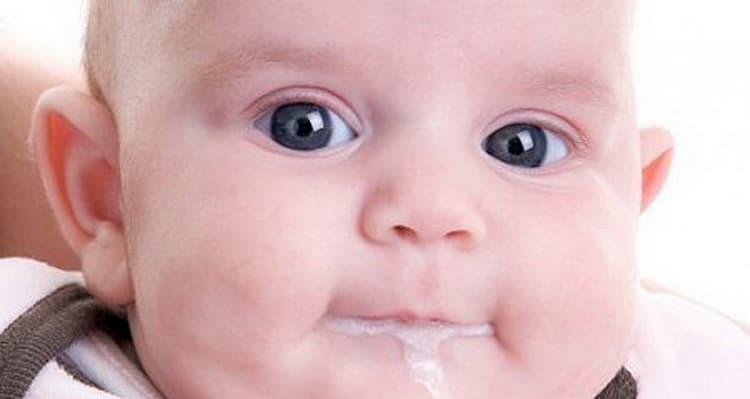
Only the first reason for regurgitation in newborns on breast, mixed or artificial feeding is physiological. Over time, on average by 6 months, the baby will have a fairly mature digestive system, and regurgitation will stop bothering him. All other causes can be controlled and eliminated by parents.
Regardless of the type of feeding, the following steps will help you avoid spitting up or significantly reduce their number.

Not always and not every regurgitation is a normal condition. Situations when you need to seek qualified medical help:

Any drug treatment is prescribed only by a doctor. Self-medication is unacceptable in any case. When examining a baby, he may be assigned:
Normal spitting up in a baby has the following features:

For vomiting:
Regurgitation in newborns after feeding has completely natural causes, says Dr. Komarovsky. It is so laid down by nature that instinctively the baby eats not as much as he needs, but as much as he likes. Therefore, when spitting up, he simply "gives" excess food.
Spitting up is a problem when the baby is not gaining or not gaining weight well. This condition indicates deviations in the development of the baby and requires a visit to the doctor.
Simply and briefly on how to prevent spitting up in babies, see the video. From it, you will learn that this is a common condition in babies, which is easy to avoid if you follow simple tips.
The vast majority of children are subject to regurgitation, regardless of what kind of feeding they are on. This problem should be considered only in comparison with the weight gain of the baby.
If there is regurgitation, but weight gain occurs in accordance with age norms, there is nothing to worry about. Correctly attach the baby to the breast or give a bottle, put it on the tummy before feeding, and after feeding, hold the baby in a “column”.